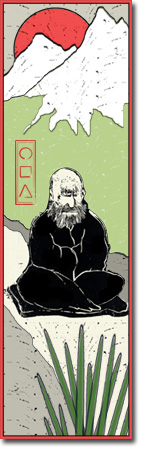On The Way: The Daily Zen Journal
Breakthrough Sermon
Bodhidharma (440 -528)
If someone is determined to reach enlightenment, what is the most essential method he can practice?
The most essential method, which includes all other methods, is beholding the mind.
But how can one method include all others?
The mind is the root from which all things grow. If you can understand the mind, everything else is included. It’s like with a tree. All of its fruit and flowers, its branches and leaves, depend on its root. If you nourish its root, a tree multiplies. If you cut its root, it dies.
Those who understand the mind reach enlightenment with minimal effort. Those who don’t understand the mind practice in vain. Everything good and bad comes from your own mind. To find something beyond the mind is impossible.
But how can beholding the mind be called understanding?
When a great bodhisattva delves deeply into perfect wisdom, he realizes that the four elements and five shades are devoid of a personal self. And he realizes that the activity of the mind has two aspects: pure and impure. By their very nature, these two mental states are always present. They alternate as cause or effect depending on conditions, the pure mind delighting in good deeds; the impure mind thinking of evil.
Those who aren’t affected by impurity are sages. They transcend suffering and experience the bliss of nirvana. All others, trapped by the impure mind and entangled by their own karma, are mortals. They drift through the three realms and suffer countless afflictions, and all because their impure mind obscures their real self.
The Sutra of the Ten Stages says, “In the body of mortals is the indestructible buddha-nature. Like the sun, its light fills endless space. But once veiled by the dark clouds of the five shades, it’s like light inside a jar, hidden from view.”
And the Nirvana Sutra says, “All mortals have the buddha-nature. But it’s covered by darkness from which they can’t escape. Our buddha-nature is awareness: to be aware and to make others aware. To realize awareness is liberation.” Everything good has awareness for its root. From this root of awareness grows the tree of all virtues and the fruit of nirvana. Beholding the mind like this is understanding.
You say that our true buddha-nature and all virtues have awareness for their root. But what is the root of ignorance?

The ignorant mind, with its infinite afflictions, passions and evils, is rooted in the three poisons: greed, anger, and delusion. These three poisoned states of mind themselves include countless evils, like trees that have a single trunk but countless branches and leaves. Yet each poison produces so many more millions of evils that the example of a tree is hardly fitting for comparison.
The three poisons are present in our six sense organs as six kinds of consciousness, or thieves. They’re called thieves because they pass in and out of the gates of the senses, covet limitless possessions, engage in evil and mask their true identity. And because mortals are misled in body and mind by these poisons or thieves, they become lost in life and death, wander through the six states of existence and suffer countless afflictions.
These afflictions are like rivers that surge for a thousand miles due to the constant flow of small springs. But if someone cuts off their source, rivers dry up. And if someone who seeks liberation can turn the three poisons into the three sets of precepts and the six thieves into the six paramitas, he rids himself of affliction once and for all.
But the three realms and six senses of existence are infinitely vast. How can we escape their endless afflictions if all we do is behold the mind?
The karma of the three realms comes from the mind alone. If your mind isn’t within the three realms, it’s beyond them. The three realms correspond to the three poisons: greed corresponds to the realm of desire, anger to the realm of form, and delusion to the formless realm. And because karma created by the poisons can be gentle or heavy, these three realms are further divided into six places known as the six states of existence.
But the great bodhisattvas have only achieved enlightenment by observing the three sets of precepts and by practicing the six paramitas. Now you tell disciples merely to behold the mind. How can anyone reach enlightenment without cultivating rules of discipline?
The three sets of precepts are for overcoming the three poisoned states of mind. When you overcome these poisons, you create three sets of limitless virtue. A set gathers things together—in this case, countless good thoughts throughout your mind.
And the six paramitas are for purifying the six senses. What we call paramitas, you call means to the other shore. By purifying your six senses of the dust of sensation, the paramitas ferry you across the River of Affliction to the Shore of Enlightenment.
You should realize that the practice you cultivate doesn’t exist apart from your mind. If your mind is pure, all buddha lands are pure. The sutras say, “If their minds are impure, beings are impure. If their minds are pure, beings are pure.” And, “To reach a buddha land, purify your mind. As your mind becomes pure, buddha lands become pure.“
Bodhidharma (440 -528)
Excerpted from The Zen Teaching of Bodhidharma – trans by Red Pine 1987




Bodhidharma’s teaching is essentially very sparse and simple… “behold the mind.” Doesn’t allow a lot of distracting philosophical points, just brings us back to awareness and turning the attention inwards. Here we have some pointed questions on various practices in different schools of Buddhism and Bodhidharma’s replies.
There are many teachings and paths in Buddhism; Bodhidharma’s Zen is not for everyone. It is like the straight path up the mountain rather than the rambling circuitous route. However, ultimately, they all get us to the same place. Some allow for more distractions, but if we have a tolerance for that, those too will fade over time.
In honor of Bodhidharma, the wall gazer, said to have sat in a cave for 9 years facing a wall, may we embrace a steadfastness in our own practice that no worldly distractions can shake.
With Care,
Elana